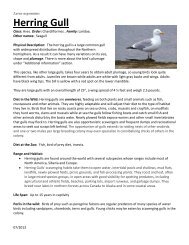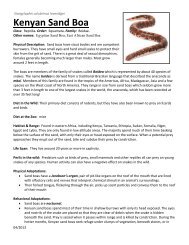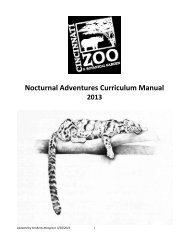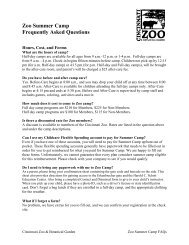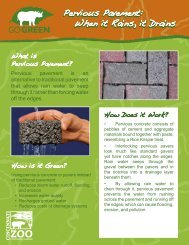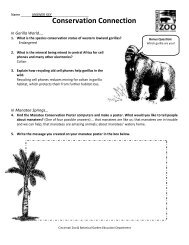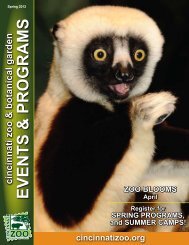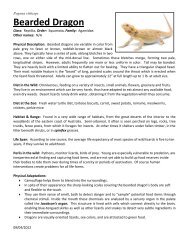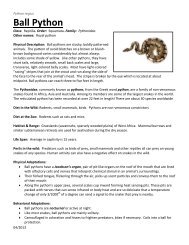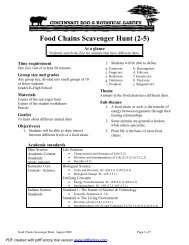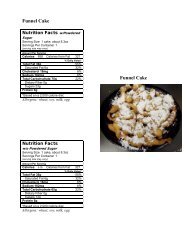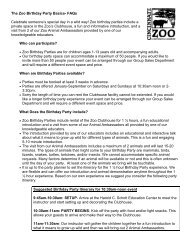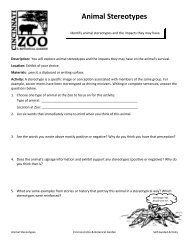2011 CREW ReView - The Cincinnati Zoo & Botanical Garden
2011 CREW ReView - The Cincinnati Zoo & Botanical Garden
2011 CREW ReView - The Cincinnati Zoo & Botanical Garden
- No tags were found...
You also want an ePaper? Increase the reach of your titles
YUMPU automatically turns print PDFs into web optimized ePapers that Google loves.
Plant Signature Project UpdatesNorthern wild monkshoodMonkshoods Spend SummerGetting Stronger<strong>CREW</strong>’s Plant Division has been growing the Northern wild monkshood(Aconitum noveboracense) for several years, developing tissue culturepropagation protocols under an IMLS funded grant, and then working with collaboratorsfrom the Summit Metro Parks in Akron, OH, to produce plants toaugment the small population there. However, after several attempts, none ofthe plants from <strong>CREW</strong> that were planted at the site survived.Each plant species is different in how readily it adapts to the “real world” afterlife in the test tube. In the <strong>CREW</strong> labs, the monkshoods acclimatized readily tolife in soil, but they were not able to survive in the wild, even after months in<strong>CREW</strong>’s greenhouse.In the summer of 2010, in an attempt to make the plants tougher, severalwere planted in the raised beds that Horticulture maintains behind <strong>CREW</strong>. Afterdying back last fall, it was exciting when, this spring, the plants re-appeared,growing bigger and healthier than before. Even more exciting was the productionof flowers. Although no viable seeds have been found yet, the plants formedtubers and demonstrated that they can survive winter. As a result, several plantsfrom the beds have been sent to Akron this fall to see if they survive winter inGorge Metro Park. <strong>CREW</strong> scientists hope the raised beds can serve as a necessarystepping stone, where plants can grow stronger and prepare better for asuccessful life in the wild.A Secure Site for Genetic JewelsAll treasures should be stored in a safe, secure place to guardagainst loss and deterioration. <strong>The</strong> same is true for plants andanimals – the biological treasures of the world. Ideally, they shouldbe guarded within their natural environment, but achieving that goalis challenging for some species because their habitats are being destroyed.Ex situ conservation, or conservation off-site, can providea back-up strategy for endangered plants and animals, and <strong>CREW</strong>’sCryoBioBank is one such “insurance policy.” It also provides a highlyefficient and effective way of maintaining many samples in a small area.<strong>The</strong> Plant Division recently completed a project funded by the Instituteof Museum and Library Services to cryopreserve tissue culturelines of five species representing multiple genetic lines. Maintainingtissues long-term in culture is laborious and associated withrisks like contamination or failure to thrive. Although the freezingprocess requires specialized protocols, over the long-term, it is lessexpensive to cryopreserve tissue lines than to maintain them indefinitelyin culture. As part of this two-year project, <strong>CREW</strong> staff hascryopreserved over 4600 shoot tips of more than 110 genetic lines!<strong>CREW</strong>’s 30th anniversary is witness to our scientists’ longtermcommitment to the survival of the planet’s biodiversity.<strong>The</strong> CryoBioBank serves as a biomaterials resource for the future,and provides an opportunity to build upon the cryopreservationscience base as samples are thawed and tested. With samples Cryopreserved plant specimensfrom over 200 species of some of the rarest plants and animalsin the world, it is definitely a treasure chest of genetic jewels.Lindner Center for Conservation and Research of Endangered Wildlife • <strong>Cincinnati</strong> <strong>Zoo</strong> & <strong>Botanical</strong> <strong>Garden</strong> 5<strong>2011</strong> <strong>CREW</strong> <strong>ReView</strong>.indd 5 11/23/11 5:03 PM



